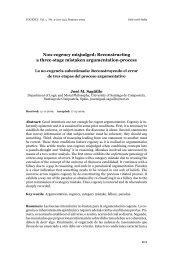Cogency v2 n2
Cogency v2 n2
Cogency v2 n2
Create successful ePaper yourself
Turn your PDF publications into a flip-book with our unique Google optimized e-Paper software.
David Hitchcock and Bart Verheij (eds.), Arguing on the Toulmin... / J. RITOLA<br />
ciple (i.e. whether one should typically use existing cognitive tools to solve a<br />
problem or opt for new ones), and the value of domain-specific logics. His<br />
discussion encapsulates many aspects of his own bountiful scholarship and<br />
the general developments in philosophy, logic, empirical sciences pertaining<br />
to reasoning, and the relation of Woods’ thought to Toulmin’s. I will not<br />
try to synthesize any of that here, but strongly recommend that anyone interested<br />
in these topics read the article.<br />
3. Final thoughts<br />
The authors of the articles are established scholars in this field, and this<br />
collection is surely among the most interesting that the theory of argument<br />
offers at the moment. The editors have done a thorough job; for the most<br />
part, the papers are clearly written and enjoyable to read. Some of the papers<br />
lean rather heavily on the previous work of the authors, but where this<br />
is the case, the papers still manage to give an illuminating introduction to<br />
those topics. In any case, the book is directed to scholars. The included papers<br />
should not go unnoticed by other authors interested in the respective<br />
topics. They are of interest to anyone who wants to know what is going in<br />
the interdisciplinary study of argument. Toulmin’s work was revolutionary<br />
at its time, and his theses are still important, connecting many developments<br />
in this area. As this book evidences, he has been a fruitful starting<br />
point for further research. Also, for a scholar with epistemic inclinations,<br />
this book makes for good reading, especially the articles by Freeman,<br />
Hitchcock, and Pinto, to name a few of the most prominent ones. These<br />
authors are putting forth explications that put some real flesh on the<br />
epistemic bone that good arguments should justify their conclusions. It will<br />
be interesting to see how these developments will be challenged, for example,<br />
by dialectical approaches.<br />
If one were to look for complaints, one could note that the book does not<br />
give the reader much information about the criticism Toulmin received, nor<br />
does it include papers that are critical of Toulmin’s work. On the basis of<br />
this book alone, it is difficult to examine the value of this criticism and<br />
whether, if there is a need, the developments in this book answer that criticism.<br />
But as noted, this is a scholarly book consisting of articles with spe-<br />
175








